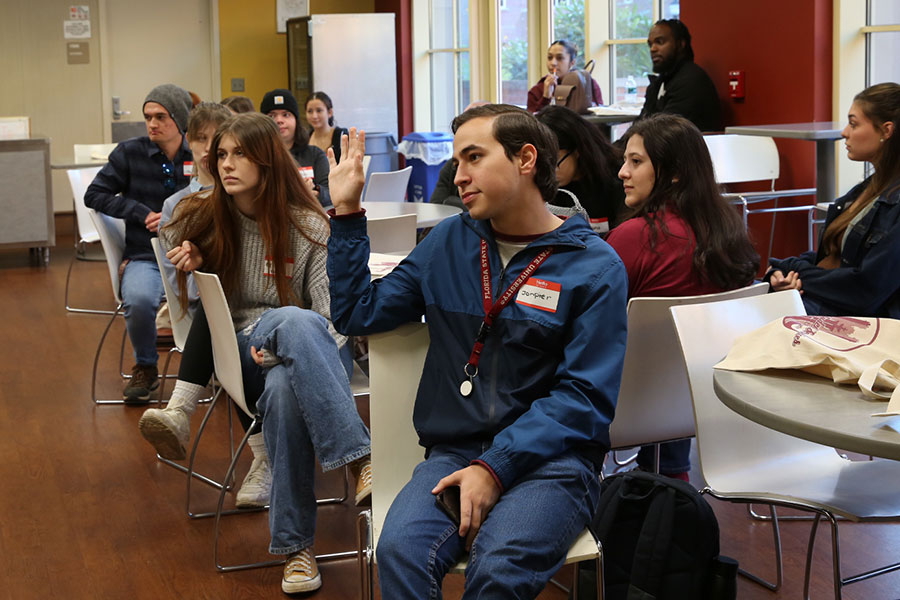
Florida State University is part of a nationwide cohort of institutions that have received an $8.8 million grant from the prestigious Howard Hughes Medical Institute to develop more inclusive pathways from community college programs to four-year universities.
The award, part of the institute’s Inclusive Excellence 3 initiative (IE3), will fund FSU research on improving relationships between two-year colleges and four-year universities and easing the transfer process, particularly for STEM students.
FSU’s Department of Biological Science — part of the College of Arts and Sciences — has partnered with Tallahassee Community College (TCC) to identify the needs of community college students wishing to transfer to four-year universities and pinpoint specific obstacles they face in that process.
Professor of Biological Science Nora Underwood is one of the program directors for the award, and her work was instrumental in securing funding.
“Community college is an important pathway for students from diverse backgrounds to access the benefits of higher education and to enter STEM fields,” Underwood said. “We were motivated to apply for this grant to increase accessibility to that pathway through collaboration between 2-year and 4-year institutions, making a more holistic effort than just supporting students at one institution. We’re excited that the issue is gaining more attention and that our community has the opportunity to play a role in reducing the barriers to STEM education, both locally and nationally.”
HHMI’s Inclusive Excellence initiative supports institutions as they build their own capacity to foster inclusion for students in the sciences, especially for students who have been historically excluded. In this most recent round, the institute invited finalists from a pre-proposal process to join with other universities to form Learning Community Clusters, or LCCs. This resulted in 104 institutions forming seven LCCs.
FSU’s LCC, the IMPACT STEM Transfer Network, has 15 member universities, including FSU. The $8.8 million will be divided among the institutions to fund their respective parts of the project.
FSU students played a part in the proposal phase of the process and will continue to support the research over the next six years. Penelope Ales, a doctoral student pursuing a degree in ecology and evolution, brings personal experience as a transfer student to her work on the IE3 challenge.
“As a transfer student, my research experience did not begin until near the end of my undergraduate career,” Ales said. “I really loved it, and I think creating the opportunity for transfer students to get those experiences earlier on is important.”
Underwood and FSU’s LCC have worked closely with TCC to identify the needs of community college students looking to transfer to universities to continue their education and pursue research opportunities.
TCC Professor of Biology David McNutt, a former doctoral student of Underwood’s, helped with the proposal stage of IE3 and will continue to work with FSU on this project.
“What’s been enlightening about this process is seeing that transfer students from TCC are doing very well when they get to FSU,” McNutt said. “In fact, their success rates at FSU after they transfer are very similar to those of students who start at FSU as freshmen. While this is promising, we are realizing there are still barriers preventing TCC students from making it to FSU.”
Though many universities have good resources through the Office of Transfer Student Services, McNutt noticed that many of his students still need a nudge to seek these out. In one of his courses, he gives an assignment that requires students to research admissions resources at FSU and other universities as preparation for an eventual transfer.
Underwood, Ales and McNutt plan to use their research in combination with a variety of initiatives to combat these barriers to successful transfer from community colleges to universities.
“I’m proud that people at FSU and TCC are so dedicated to doing this work,” Underwood said. “At a local level, we want the transfer process to become easier and more effective for students coming from TCC to FSU. On a broader level, we’re excited to be able to inform transfer experiences at different institutions and learn from the other award recipients.”
To learn more about the Howard Hughes Medical Institute Inclusive Excellence 3 award, read their official announcement here.




